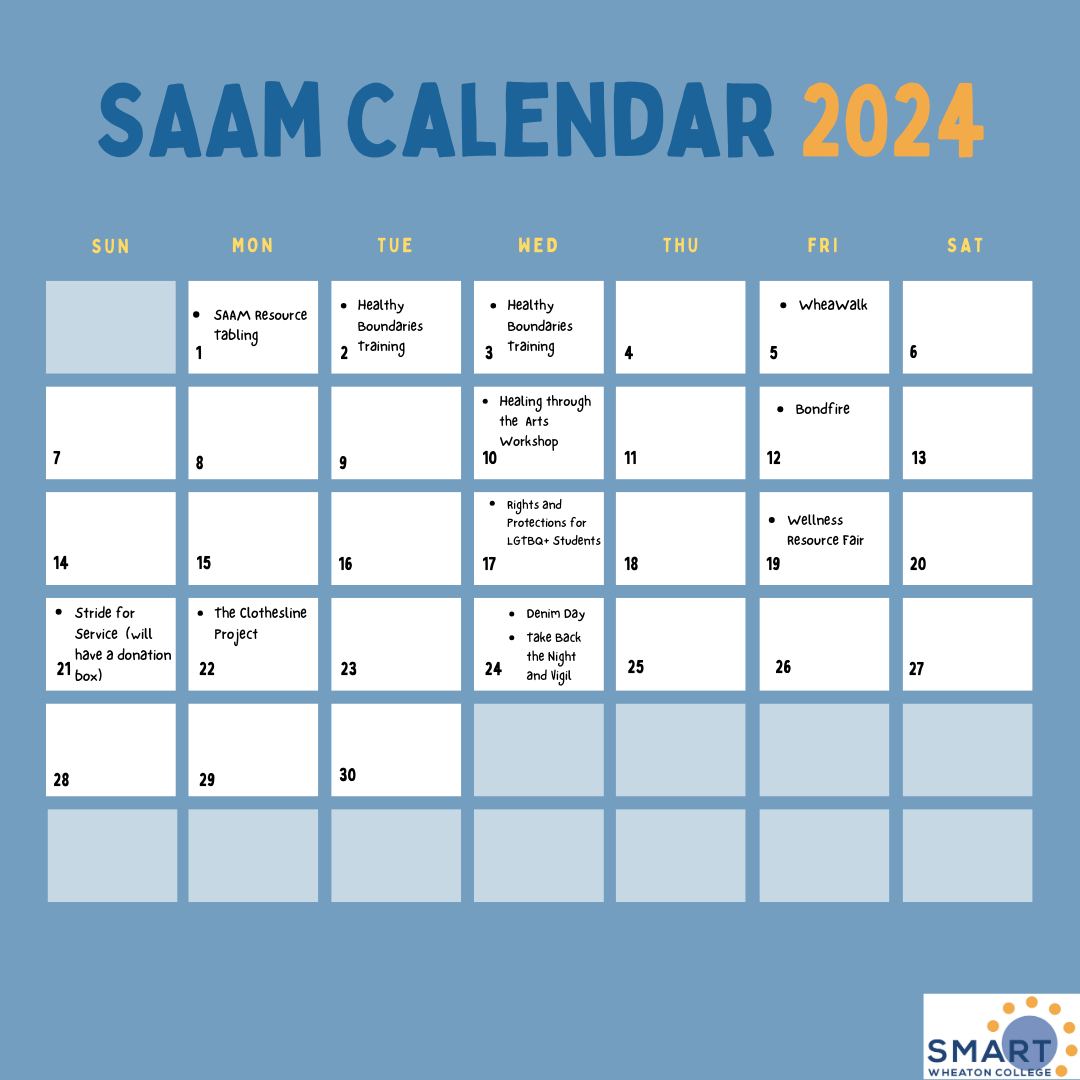By Sam Ferland and Marguerite Bartlett
Sexual Assault Awareness Month (SAAM) is now underway with several events and discussions taking place at Wheaton during April.
The Sexual Misconduct and Assault Resource Team (SMART) has an education program on campus that will be holding several events during SAAM to create awareness about sexual misconduct and assault, specifically on college campuses. This is a topic of severe importance, as sexual assault is a common problem on college campuses across the United States and the world.
According to the Rape, Abuse, and Incest National Network (RAINN), an American is sexually assaulted every 68 seconds, with college women aged 18 to 24 facing a three times higher risk than woman out of that age range. Recognizing the significance of sexual assault prevention, protection, and support on college campuses is crucial. RAINN reports that 26.4% of female and 6.8% of male undergraduate students experience rape or sexual assault.
When asked about SAAM, an anonymous student rape survivor from Wheaton said, “SAAM has become a significant source of support for me after my assault. It has given me the courage to gradually open up to more people. I have wanted to speak up numerous times but was always too scared. The statistics weigh heavily on me knowing how many people are unable to get justice. Despite the challenges, I have hope for others. I hope that one day, if another girl feels lost and alone, the efforts of SMART and SAAM will pay off, and they will know where to seek help.”
She emphasized that being raped is something one cannot forget, and resources like SMART make a difference. If there was one piece of advice she wished she had known it would be to “not be afraid to speak up. It will never be your fault and never lose hope.”
The SMART Program, run out of the Title IX Office, also brings together the SMART Team. The team is an inclusive group consisting of faculty, staff, external partners, and students who advise other students about campus outreach opportunities, identify resources, report options on and off campus, and promote education aiming to create a safer environment at Wheaton.
“I think Wheaton’s resources specifically in regards to emergency information are very helpful. Wheaton provides confidential medical care regardless if you are ready to report, which is very important. If you are ready to report but want to stay anonymous, there are resources for that too which I really appreciate,” said student Emily Huntington.
There will be at least 10 events throughout April, including a month-long toiletries drive for a new shelter being opened by New Hope. New Hope is a sexual assault resource center with a 24/7 hotline, whose main office is located in Attleboro, Mass.
Intake Training and Prevention Coordinator, Dayna Vachon Wheeler, is running the toiletries drive to help gain materials for families affiliated with New Hope, with a donation box in Balfour.
SAAM started the month with a resource and information table in Emerson Dining Hall regarding the events this April, hosted by Vachon Wheeler and Title IX Coordinator Caraline Somerville.
The Title IX Office and SMART’s education program promote work to prevent misconduct as well as educate students on Wheaton policies that comply with Title IX, which is a federal law that prohibits sex discrimination in education environments. The program includes guidance for schools on how to respond to reports of sexual and gender-related misconduct. Title IX was first outlined in the Education Amendments of 1972 and has been amended many times since then.
SMART has begun a transition, following the end of a federal grant offered by the Violence Against Women Office. The grant funded new responsibilities and opportunities for the former SMART Coordinator position.
“The old SMART Coordinator position was part of a grant, and our time with that grant ran out earlier this year. The College has used that opportunity to invest in this space and fulfill needs where the previous role was more limited. This investment will help Dayna’s position better meet the needs of our community on individual, organizational, and all-community levels,” said Somerville.
The former SMART Coordinator role has transitioned into Vachon Wheeler’s current role of Intake, Training, and Prevention Coordinator. Among other expansions, the new role allows her to have report intake sessions with students who were previously not permitted in the grant-funded role.
Part of Vachon Wheeler’s role also includes community outreach and supports students conducting events such as Denim Day and Take Back the Night, both taking place on April 24.
Denim Day, which takes place on the last Wednesday in April, originated as a campaign in the 1990s in response to an Italian Supreme Court ruling involving an 18-year-old girl who was raped by her driving instructor.
“Part of my role is being able to highlight these events that [student groups] are doing during SAAM and be a part of it. I’m happy to sit there, be at that event and support that happening,” said Vachon Wheeler.
There are numerous student groups involved in SAAM including Emerson House, Tulip House, Sexual Health Advocacy Group (SHAG), and TWAP.
Somerville, Vachon Wheeler, and the SMART Team encourage students to reach out in need of resources and information.
